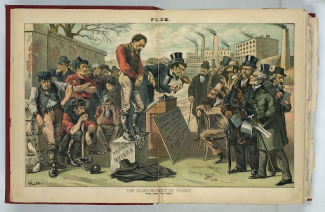
Boston’s Freedom Trail is one of the city’s biggest attractions, a red brick path that connects 16 landmarks in the city’s role in the American Revolution. Now, “Unbound,” a 14-foot statue honoring the enslaved people of Boston, is the city’s first statue of a Black woman and one of the first markers to reference the role of slavery in Boston’s history.
Contrary to belief, slavery became legal in the North in the 1600s, when towns in the colonies of Massachusetts, Connecticut, New Hampshire, and Rhode Island were major hubs in the transatlantic slave trade.
In 1641, Massachusetts became the first colony to legalize slavery. By 1707, Massachusetts was so desperate to retain its slaves that free Black people who helped runaways were fined.
Industries in Boston, such as farming, shipbuilding, distilling, and construction, would have collapsed without the foundational work of enslaved people. That’s why it’s important to dispel myths that hide or minimize the economic impact of enslavement.
Memorials like “Unbound” are more than art, they’re historical proof of our presence and our survival. How do you see ways we’ve survived in your own neighborhood?